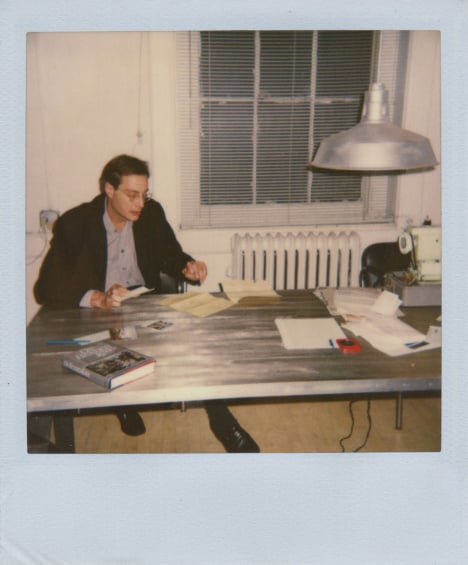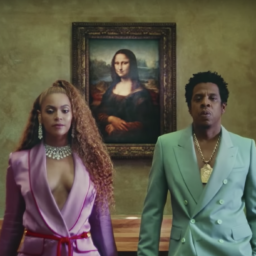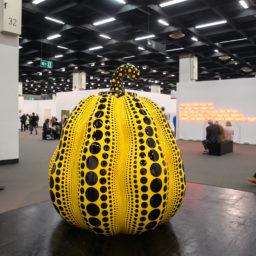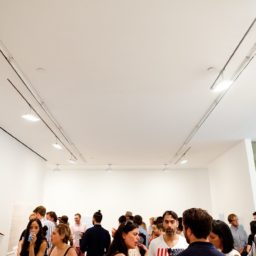In 1984, artist Lyn Blumenthal used a recently released Panasonic portapak to record an interview with the late critic Craig Owens. Owens, whose interests included feminism, photography, and postmodernism, was among the founding members of the journal October and a longtime editor at Art in America magazine.
A new book from artist Paul Chan’s publishing house, Badlands Unlimited, reproduces a transcript from that interview, which was part of a series of videotaped encounters with artists including Lee Krasner, Joan Mitchell, Sol LeWitt, and Joseph Beuys. The conversations, conducted by Blumenthal in collaboration with fellow artist Kate Horsfield, are housed at the Video Data Bank.
In the book, Craig Owens: Portrait of a Young Critic, Owens describes his reckoning with feminist and postmodernist thought in the context of a life that took him from small-town Pennsylvania to the beating heart of the New York art world.
In the excerpt below, the book’s first chapter, Owens discusses his attempt to get away from writing in an apparently objective voice, and his desire to write a book that would liken the serial production of artists like Warhol to serial killing.
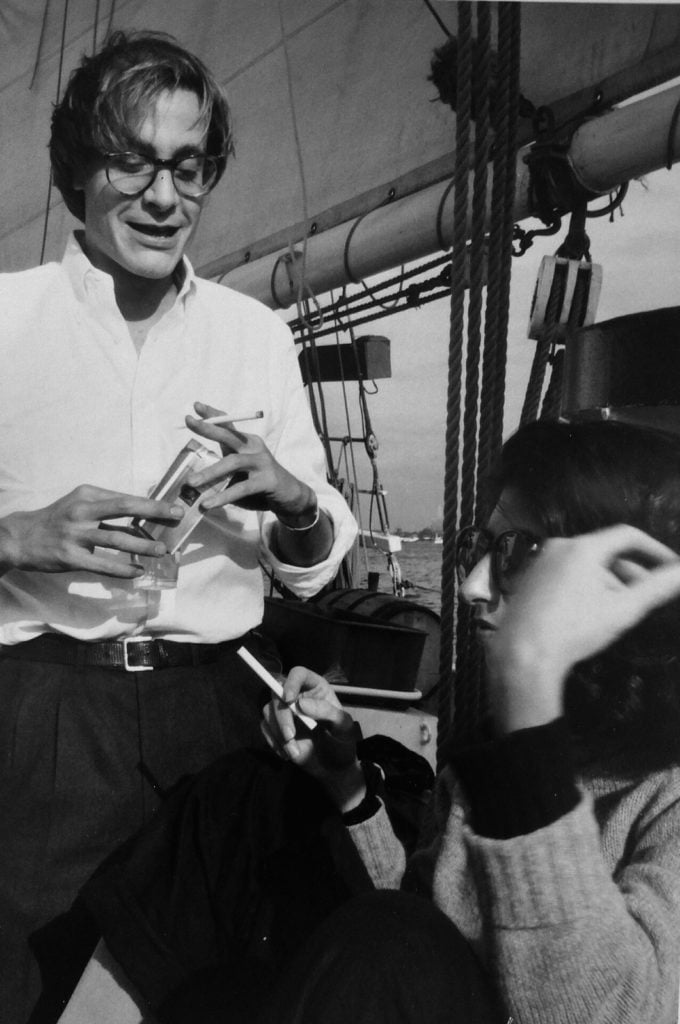
Craig Owens and Joan Simon at an Art in America office party on a sailboat rented from South Street Seaport, New York. Photo: Elizabeth C. Baker.
How do you see yourself reflected in your work?
In 1980 or ’81, I went to Los Angeles for the first time professionally and gave a lecture. It wasn’t a very good one. It didn’t quite come together. But Dorit Cypis, who had sponsored the lecture when she was director of the Foundation for Art Resources (F.A.R.), said to me at the end of it that she thought it was great because it was very personal and that she really saw my own investment in the things I was discussing. I was shocked.
[Pause.]
I always believed up to that point that there should be some radical separation between self and work—a separation that of course was theorized. I don’t totally understand this anymore. I don’t completely know why or how this is the case.
I think my work now is involved in a continual self-questioning that isn’t a kind of existentialist “who am I” questioning, but an inquiry into the self as constructed and positioned, which necessarily gives the work an air of intellectual intimacy. I have tried, at least in the recent work, to position my voice so it doesn’t sound like a third-person historical voice of authority. Many people disagree. Many people think that the texts are in fact products of a falsely constructed authoritative voice. I hope that that’s not the case.
It seems to me that, through the course of your writing, you have become more visible. This is particularly true for me in reading “Discourse of Others” and also, in the piece that you wrote on Barbara Kruger, where the work and ideas that run through the work seem to be developing together like an internal dialogue. I was wondering if you could talk about that.
Usually in the middle of writing a text, when a crisis is about to erupt, I discover what I’m really writing about is something that has very deep and personal resonances. Two examples: In a short text that I wrote about Dara Birnbaum, I talked a great deal about the narcissistic structure of the media. I recognized that, at some point in writing, certain work I had read and was incorporating in the quotations had to do with my own narcissism. But not just my own narcissism: the social function of narcissism and how I was implicated in it.
Freud talked about how narcissistic figures are the most attractive, the most seductive, precisely because they are those without defect, without lack, and therefore exclude the viewer. I used Freud’s analysis of narcissism to discuss our fascination with the media, locating it in relationship to the fact that, as I wrote, “We’re most fascinated by that which excludes us the most.” That’s from Baudrillard. But in the process of writing I was beginning to understand the structure of my personal life, and how I was most fascinated by that which excluded me most—my own attraction to the narcissistic. And I discovered that in the process of writing the text.
I could probably go back to earlier texts and maybe detect something similar. But this was the first time I thought about it consciously.
The text on Barbara Kruger was the first in which I began to discuss the issue of the pose. I’ve developed that in two subsequent texts, neither of which is particularly successful. But those texts were written at a time in my life when I increasingly felt my inability to identify with the role I was playing in terms of my public image, my public role, my persona—what I described to you before as my “Craig Owens act,” which I can come out and do, and I am hired frequently to go out and do.
Now, of course, this is true of subjectivity in general. But, at this moment, I feel it very acutely in my professional life. I have begun talking about, and have become attuned to the fact that so much contemporary production deals with precisely this issue. The notion of the construction of the mask, the masquerade, seems pervasive in contemporary art. So I’ve begun to try to theorize the issue of posing. I tried to write about the pose in photography and then was shocked to learn that the first theoretical discussion of the pose in relationship to the photograph occurs in Roland Barthes’s last book. As far as I can tell, in the history of photography criticism nobody else had talked about it.
Obviously, in this case, there is some deeply personal motive. But the task of going through this is to gain some kind of objectivity, whatever that means. Some kind of understanding that deepens and expands the intuitions beyond simply autobiographical or personal terms. Hopefully, that kind of investment in the work gives it a certain kind of, what—resonance? Theory is that which enables an understanding of how natural and utterly mistaken it is to think that one is unique. I found that Kruger’s work certainly dealt with many of these issues. My encounter with Barbara’s work, and writing about it, enabled me to reflect on some issues about who I was and maybe, more specifically, whom I was posing as. I don’t know that this would necessarily be an agenda for critics to follow.
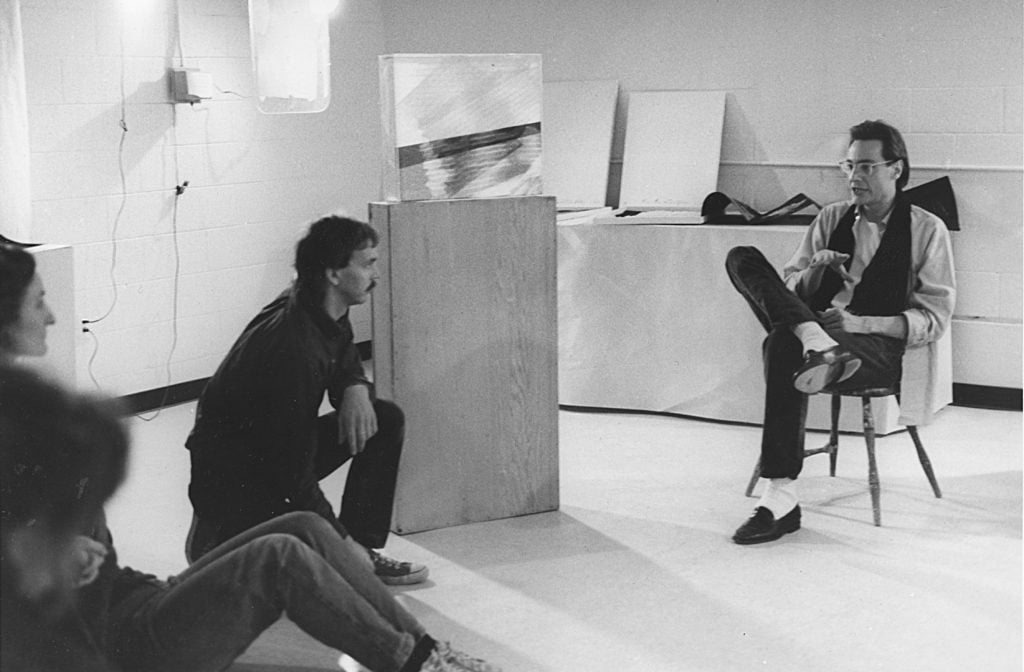
Craig Owens speaking with students at the University of New Mexico public series ART/MEDIA, Albuquerque, New Mexico, February 10, 1986. Photo: Eve Andrée Laramée
Could be.
The mistake is always then that the idea of subjectivity becomes the dominant motif in the work. What I’m trying to talk about is the way in which one can use theory to gain a certain kind of distance or perspective on subjectivity, not to eclipse or to replace the subjective, but to understand it, and to locate it within a context of other elements. I would hope that I don’t provide interpretations of work, but simply a certain model of how to go about dealing with it. I don’t want to proclaim, “This is the meaning of this work,” but instead, “How can one place this work? What is one possible way of doing it?” And that’s why the work itself gets wildly eclectic, which I think is a problem. It moves around a little bit too much.
I get the feeling art criticism is both theoretical and personal for you, is that right?
Well, for me, it will always have this personal cast to it. But art criticism is not a particularly reputable profession, and it’s not something that one feels particularly, I think, good about being—an art critic. Especially if one considers the way one’s colleagues conduct their professional activities.
So if we’re talking about success and how you see yourself reflected in your work, is it possible within the culture for criticism to turn the corner, so to speak? To change?
Not in isolation. But it has a chance if it conceives of itself as being in fundamental solidarity with other forms of political activity. And I think that it’s necessary for those forms of political activity to be accompanied by a certain critical practice that operates on multiple levels. Critical practices operating within the most supposedly avant-garde, hermetic academic discourse waging battles within the academy. Journalistic criticism waging battles in the media. And so on. Criticism can participate in creating some small transformations in its own sphere of influence that are amplified each time that they’re linked up with others. I have very little patience with those critics and practitioners who sit around and say, “Well, art never has changed the world, never will change the world.” I think that it’s a mistaken idea. We’re attempting to change the terms of the debate that determine how affairs in that world are conducted. And I think that it’s the right that sees perfectly well, that it can go in there and change those things, that it has demonstrated to us in the past five or six years that one can take control and can change those things. If we sit back and say, “Well, we can’t change the world, this is a hopeless thing,” we just let other people do it. People are changing the world every minute. And that’s where I feel, “Yes, it’s possible,” but it’s not that one’s going to bring about the socialist revolution tomorrow.
What are you working on now, besides bringing the socialist revolution? [Chuckle.]
[Chuckle.] There’s the immediate project, and then there is the project I would like to be working on, where all of this seems to lead for me.
Let’s talk about that.
I would really like to be able to find the time and the financial support to work on a book that would either have the title or be about the political economy of culture. I find that there’s too much talk about the market, about which we don’t have the slightest idea. There is not much clarity about how the art market really works or how it relates to the broader economic processes of society. And not just the visual arts, but culture in general and the political economy of culture. If there is going to be some kind of transformation in the culture, I think it’s going to be at the base: the transformation of the economic position and the way in which that affects cultural production.
So it’s a book that begins with Warhol and the advent of serialized production in the visual arts, and talks about the serialization of artistic production since about 1962, ’63, and the fact that it’s pretty damned hard to go out there and find any work of art that is not in a “series.” I think we don’t have a language or vocabulary to deal with that, and there’s a lot of issues that come up with this, and it interests me. It’s also a way of linking phenomena within the art world to phenomena outside, because one has obviously serialized production techniques in manufacturing, Hollywood, or whatever. But we also live in a society that has serialized behavior, which some artists seem to be talking about at this point. And we have serialized murder. I’m very interested in serialized murder in relationship to serialized art production, because I think a connection can be made on the grounds of political economy. We are witnessing a massive disavowal of the economic aspects in the art world, which, of course, never acknowledged its existence in the first place. And it seems crucial to insist on those terms. I’d like to try to develop some kind of analytical model for understanding transactions that go on between art and economy.
I think that is great.
Well, there’s much stuff there. The second half wasn’t as…
As what?
I don’t know. As focused or as something as the first half.
No. This… you’re… I disagree.
Is it over? [Chuckle.]
What does success mean to you?
[Chuckle.] Co-optation.
Not success in the…
[Chuckle.] There are two possible questions in that question. One would be, What would I consider success to be?
That’s the question that I’m asking. What’s your other question?
The other one would be: What is your relationship to that thing called success, the sort of validated, established means of recognition? The notion of success as recognition is a very strong one. It’s too easy to persuade yourself that you’re successful just because people read your work. People call you up from Texas and ask you to come and speak. That’s success, right? The more successful I have become in these terms, the more of an antagonist I become to that kind of success.
[Chuckle.]
That may lead to certain forms of suicidal behavior, but the kind of success that I would envision would be tied to notions of effectiveness. Whether one’s work was actually able to make some difference, not simply in the reader’s perception of things or the world, but actually at the level of the way in which the culture functions, actually intervening in the material operations of culture and possibly having some kind of effect. This is a long-range program. It seems to me that the rewards that are offered to us are designed precisely to pacify us and to make us absolutely complacent, irresponsible members of the art world. And, to some extent, I feel that that kind of success is probably necessary if the other, more serious kind of success is to operate. As much as I wish this were not the case, it’s probably necessary to have a certain kind of recognition in order then to be able to do your work, even though it involves all kinds of compromises and can make you crazy at times. But one cannot stop there.
Another way to think about success would be to be able to move to a position. I would probably feel successful if I could get myself to a position where I could determine the terms of my own work, rather than having them dictated to me. Now, that may be somewhat foolish, to think that that could ever happen, but one does not feel particularly successful when one is always responding. I think that being able to set the agenda, and to set it responsibly, would be a form of success that I would want. But that sounds too much like power.
[Chuckle.]
I don’t think it sounds like power. Well, actually, it does and it doesn’t.
Well, you want power in order to exercise it in a way that you feel it’s not being exercised at present.
Someone once described this to me as “good capitalism.”
[Chuckle.]
Right, if there is any such thing.
